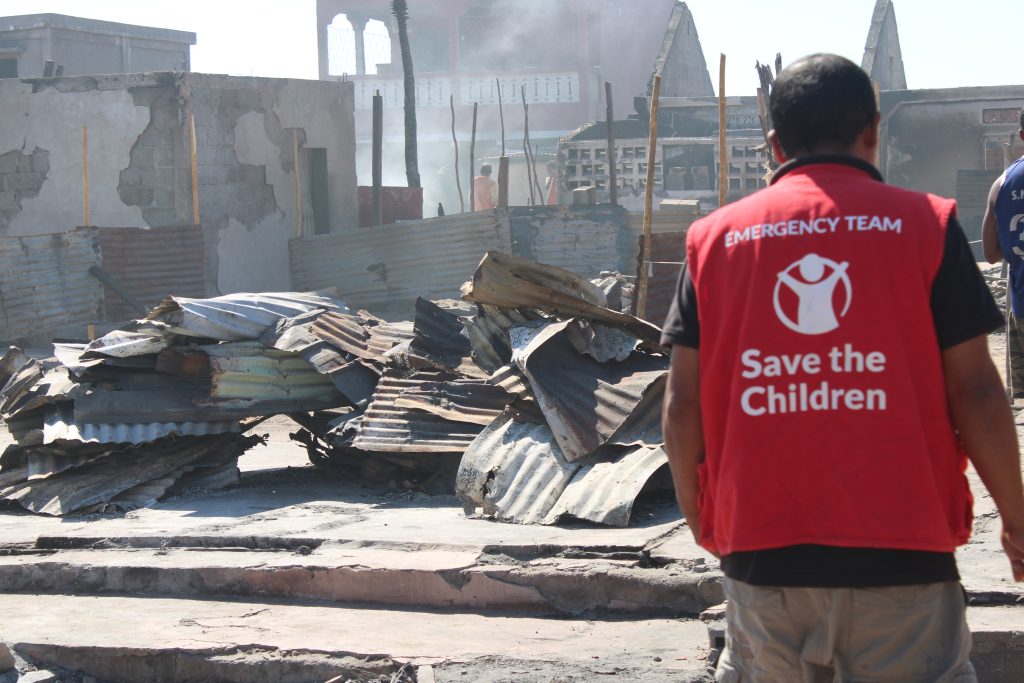12th October 2025
On 13 October — International Day for Disaster Risk Reduction — the world is called to pivot: from reacting to crises, to proactively building resilience. Under the theme “Fund Resilience, Not Disasters”, this year’s IDDRR highlights the enormous financial cost of disasters — estimated at over USD 2.3 trillion annually when indirect losses are counted — and makes the case that every dollar invested in resilience saves far more in future losses.[1]
When disasters strike, the damage is immediate — but the costs are far deeper, unfolding through lost lives, shattered livelihoods, and weakened systems.

As climate impacts intensify and natural disasters occur in the midst of protracted conflicts, crises are growing in frequency and complexity. At the same time, the international humanitarian system is increasingly under threat in the wake of global cuts to humanitarian aid. In this context, the world cannot afford to keep waiting to pay for recovery when disaster strikes – we must fund resilience.
Resilience is not built in the aftermath of crisis, but long before it. It is built when we invest in people who understand the risks their communities face and can lead, organise, and act locally to prevent crises from becoming catastrophes. That is why, at the Humanitarian Leadership Academy (HLA), we believe strongly in investing in local humanitarian leaders – compassionate, skilled, and knowledgeable individuals who challenge power imbalances and drive lasting change – and in accelerating the movement for locally led action, ensuring that decision-making and resources sit with those closest to the risks.
Keeping investment in people at our front and centre, Kaya – our free e-learning platform – is reaching nearly a million people globally who are upskilling across all areas of humanitarian response in their own time, gaining the tools to anticipate, respond and adapt to crises. In 2024, over 1,000 people benefitted from HLA’s leadership programmes, including youth from Türkiye, Syria, and Peru who gained first-hand experience through our Young Humanitarians Internship Programme (YHIP). These young people represent the future of humanitarian action — dynamic, representative, and ready to lead the response to tomorrow’s risks.
At a Youth Leadership workshop in Gaziantep – the epicentre of the 2023 earthquake and the coordination hub for the humanitarian response in Syria for many years during the conflict – one young woman’s words carry the very essence of our focus. She said:
“When the war started in Syria, I was 12. I know what it means to have a hard childhood, and I am determined to help children and youth make decisions and build a community where people can have hope. That is why I came here — to help my community be strong no matter their story.”
Another participant at the same workshop said:
“I’m walking away with a full backpack: filled with new knowledge, meaningful reflections, and inspiring people. From risk mapping and emergency planning to identifying barriers to youth leadership, the content was both thought-provoking and practical.”
According to Elka Baldeón, Executive Director of DAS Peru – who HLA partnered with for YHIP, investing in young people in the humanitarian sector “not only raises the quality of life of indigenous communities in the present, but also lays the foundations for a more resilient and self-sufficient future – preparing young people to lead and sustain the progress of their communities for future generations.”
When we ask the question: What can we do now to help communities grow stronger and more resilient? HLA responds by investing in young people, in organisations and by intentionally bringing responders together to share experiences, co-create and lead together.
We invest in organisational leadership, helping local NGOs refine governance systems, strengthen crisis management, and embed stress and resilience practices, so that they can withstand shocks more effectively. Our process consultancy in partnership with the Aid Fund for Syria, for instance, supported five local organisations to enhance their agility and efficiency. A participant in our Crisis Management Training in Syria shared:
“We built flexibility into our systems because we needed to respond faster.”
Investing in resilience means local leaders having an opportunity to step back, reflect and move forward stronger.
That’s why we’ve invested in building a global pool of humanitarian coaches, ready to provide coaching support to individual leaders and teams. At a leadership session for 17 Ethiopian women, a participant shared:
“Before this training, most of us have just been on survival mode because of the conflict. We have not had time to reflect on what our position in life is, what we can offer or what we stand for. This course is giving us an opportunity to do that and reflect on strengths we have and how we can use that to make positive change.”
Resilience thrives in connection.
Through our Humanitarian Xchange (HX) events, podcasts, and networks, such as the Women in Leadership Network, we convene local voices from across regions — turning shared challenges into shared solutions. Each exchange strengthens the collective capacity of our sector to act faster, smarter, and more collaboratively, moving beyond competition toward collective strength.
“We stopped seeing each other as competitors. The learning space made us collaborators.” — Participant, Türkiye
Testimonies from the Humanitarian Xchange run just last month in Port Sudan highlight how bringing people together isn’t just about dialogue, it’s a catalyst for joint problem-solving and solidarity.
As Mr. Ahmed, the HAC Commissioner Representative, put it “The HX conference is very important and it was needed long time ago to have local leaders from the humanitarian community share experiences, find solutions and work jointly.”
Another participant shared: “It’s the first time I’ve attended an event where leaders from different organisations are openly sharing their experiences, strengthening each other’s capacities, and learning together.”
This #DRRDay, we call on donors, governments, and humanitarian partners to fund resilience, to invest in local systems, networks and leaders, particularly youth as the next generation of humanitarian leaders, in disaster-prone communities today.
Because when we trust local leaders, and when we equip young people to lead, we don’t just respond to disasters — we invest in a future where every community has the capacity, confidence, and leadership to thrive, no matter what comes next.
Finally, a personal reflection, it would be remiss of me to write an article about resilience and not mention the resilience of our own HLA team. Like so many organisations, we have faced profound change over the past months, but our team have remained true and steadfast to our mission, funnelling energy and passion into a renewed sense of purpose, and remaining excited and hopeful for all we can achieve in the sector when we work in local partnership, come together in coalitions and continually adapt to and take advantage of technological advancements. A huge thank you to each and every one of you – I couldn’t be prouder.
About Jennifer Dias
Jennifer (Jen) Dias is the Head of Crisis Response, Impact and Delivery at the Humanitarian Leadership Academy, overseeing the delivery of our strategy, particularly in the areas of leadership development, convening and research. She has held a range of roles at Save the Children since 2018, including as Head of Learning and overseeing our technical capacity strengthening programmes in areas such as education, health and child protection. With over 20 years’ experience in the international development and humanitarian sector, her varied career previously saw her manage refugee camp hospitals and respond to refugee influxes and other emergencies on the Thai-Myanmar border, build a global Advocacy team for an animal welfare organisation, and advocate to governments and UN agencies across diverse issues from protection of former child soldiers, to changes in livestock and agricultural policy. She believes that local organisations must be the decision-makers in humanitarian response, and is committed to delivering a people-centred leadership and convening offer for the sector that is rooted in local expertise, shaped by evidence, and responsive to the system-wide shifts the humanitarian sector urgently needs.
